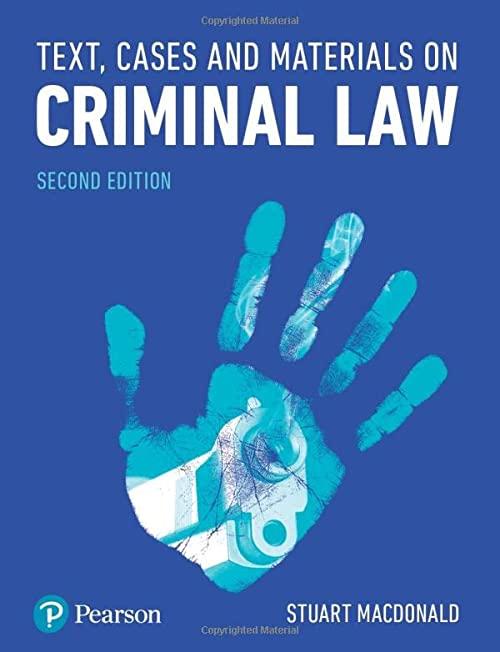Question
Short Answer. Administrative agencies are generally required by the Due Process Clause to hold an administrative hearing when it decides to enforce its regulations against
Short Answer.
- Administrative agencies are generally required by the Due Process Clause to hold an administrative hearing when it decides to enforce its regulations against an individual or a business entity. However, agency enforcement hearings are typically less formal than a judicial or court hearing and there are significant differences between a judicial proceeding and a quasi-judicial hearing. Identify two major differences between the two types of hearings. (5 Points)
- In the case of Bally Mfg. Corp. v. New Jersey Casino ControlCommission, 85 NJ. 325 (1981),the Plaintiff Bally challenged an agency regulation that limited the sales of its slots to casinos to a certain percentage of the casino's overall number of slots.Bally's claimed that it was singled out, targeted and harmed by the agency and deprived of due process and an administrative, evidentiary hearing regarding the factual basis of the agency's claims. After reading the case, do you think it was fair of the agency to proceed in its rulemaking capacity to deprive Bally, the premiere maker of slot machines, of its otherwise lawful business pursuits? Explain. (5 Points)
- Explain why the New Jersey Supreme Court in the Bally case believed that the 50% limitation imposed on Bally was not "arbitrary and capricious" despite the agency's failure to articulate a basis for adopting that percentage. Do you agree? (5 Points)
Section III. Practical Skills Section.
Question A introduces the Student to a basic method of finding a state statute through Westlaw Campus Research, accessible through the Library/A-Z Database tab on our course Canvas menu. Question B requires the demonstration of the practical skills of finding and reading a NJ Supreme Court opinion using Google Scholar or Westlaw Campus Research.
- Using Westlaw Campus Research, click on "Statutes and Court Rules," search the New Jersey Statutes and find the state's "Administrative Procedures Act" by typing its title into the search bar. The Statute may be found under Title 52, Chapter _______.
- Find and review the case of Tarus v. Borough of Pine Hill, 189 N.J. 497 (2007) and summarize and explain the findings of the New Jersey Supreme Court on the following question: Did the Council violate the Plaintiff's right to videotape a municipal council meeting when it ordered him to stop and had him arrested for refusing to do so? In other words, were the Council's actions towards the Plaintiff "arbitrary, capricious and unreasonable?"
Section IV.
Find and review the case of In re Reallocation of Probation Officer, 441 N.J. Super. 434 (App. Div. 2015) and summarize the finding of the Appellate Division in that case in one or two paragraphs. Be sure to explain the "arbitrary and capricious" standard used by the Court to assess the agency's action.
Step by Step Solution
There are 3 Steps involved in it
Step: 1

Get Instant Access to Expert-Tailored Solutions
See step-by-step solutions with expert insights and AI powered tools for academic success
Step: 2

Step: 3

Ace Your Homework with AI
Get the answers you need in no time with our AI-driven, step-by-step assistance
Get Started


